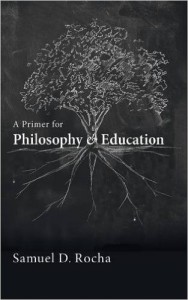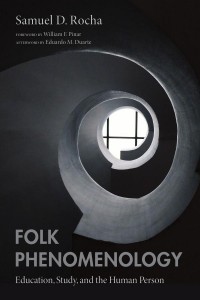
AR: You bring up the issue of study in your answer. I know that education plays a large part in this book and your previous writings like A Primer for Philosophy and Education. What is the connection between doing art and philosophy in a folk way and educational method? Where does education lead, what should it pursue (If I may pun on the etymology of method)?

SR: In all my work I insist that we must distinguish between education and schooling ― in this book I end by imagining “education after the death of school.” That hard distinction would significantly adjust what “educational method” is, since so much of the talk of method in relation to education is obsessed with schooling. In your careful phrasing, it would lead in two directions: inwards through study and towards the human person and outwards beyond the mystery of education, in pursuit of love. This is why my book relies on a folky rendition of eros as a fundamental concept (the motor behind the claim about art). But perhaps the questions of method are, again, more properly situated within phenomenology than in education, which serves (along with study and the human person) as a case study for the book’s phenomenological framework. What may be original to this book’s notion of education proper is that it treats education as a contextual entity, with an analogy to Being, instead of as a psychological, political, or institutional one. What I mean is that education does not lead in the same sense of leading nor in the same direction as the more schooled entities we usually assume it (education) to be.
AR: The language you’ve used in this interview does not seem folky to me. Is that because my prejudices confuse folky with something for mindless simpletons (like a VW Beetle from circa 1938)? Is your ratcheting up of the technical language (some of it would make Husserl blush) in this interview intentional, an invitation to just about anyone who might happen upon it to engage the phenomenological tradition? Come to think of it: Is this interview for Every(wo)man? Should Every(wo)man read your book, Folk Phenomenology?
SR: Well, I didn’t title the book “Folky Phenomenology” or “Folkish Phenomenology,” but you are right, of course, that I am speaking in a stuffy, philosophical prose here. But rather than break into something more stylish or Dylanesque, I think that my usage of technical words and a priggish philosophical manner is probably a way to understand the book’s philosophical relationship to phenomenology. Its relationship to folk art and music is perhaps best put a different way.
Last night I saw a great show at a shitty old Anglican Church in Kitsilano sponsored by the Rogue Folk society. It was packed with nostalgic types and hipsters drinking beer in pews and buying transparent red vinyl. The headliner was Don Ross, the most established fingerstyle guitarist not named Tony Emmanuel. I saw him almost a decade ago at the Cedar Hall in Minneapolis, MN (there is a footnote about this in the book, he shared the bill that night with Michael Manring). Ross has played for this Vancouver folk music society 25 times, but last night he mentioned that he doesn’t fancy himself a “folk” musician. But then he reversed himself. Ross cited Louis Armstrong who, when asked to describe his music, said, “I play folk music, music for folks.” This aroused a chuckle in the room, but I think it also describes a tension in my work and its relation to the “folk” in your questions.

Most folk music is like the parables of Christ; folk tales are seemingly simple, but enigmatic, aphoristic, and difficult. This might be why folk music cannot simply be “learned” ― it requires being lived in its cultural and spiritual home. Now, this “home” may seems accessible and downright popular if you see it in its natural state, and it invites imitation and popularisation (think of Nashville country these days) but often it evades popularity in its own home. I’m not going to give you an easy idea of the folk anymore than I could commandeer a clear portrait of phenomenology or that we can really understand what the parable of the sower was all about, even after it got explained twice. Part of this is intentional but most of it is simply because of what Jean-Luc Marion calls the excess of the things in question.
I’m not sure there are books out there for everyone, especially since everyone cannot read, but I am certain this book is not for many people simply because of the line it toes between philosophy and art and, more importantly, the frustrating ways it communicates. I mean, the book makes many direct references to my children, to the Disney cartoon adaptation of Robin Hood, to Five Guys Burgers and Fries, and to a baby gorilla at the Columbus zoo, and to Segovia; it also discusses Heidegger, William James, Marion, Charles Taylor, Thomism and Orthodoxy. In between all of that is a lot of tedious discussion and analog photography of mixed media graphics and line drawings. To put it technically, it’s a fucking mess ― and that strikes me as being for any and everyone.
AR: Since it is the central claim of your book . . . In five sentences or less, with as much street language as you can muster, what does it mean to claim “Art precedes metaphysics”?
SR: The language of the street, the words of the beggar, the wild-eyed gestures of the crazy person, the cooing and screaming of the infant, the silence of God: all of this points to something deeper than a smart formula. Indeed, there is something dumber and more true about reality, something so stupid and idiotic that it can hardly be mentioned anymore in the efficient causation of the modern day-to-day. This is art and it ain’t smart.
AR: Thanks for Being-there for this interview . . .
You’ll also want to take a look at my review of Sam’s last album. Don’t miss my TOP10 List of Catholic-interest Wipf & Stock books. They are the publishers of Folk Phenomenology.
Continuing this blog is a gift that depends on your gifts through the donation button on my homepage . . . Much obliged.












